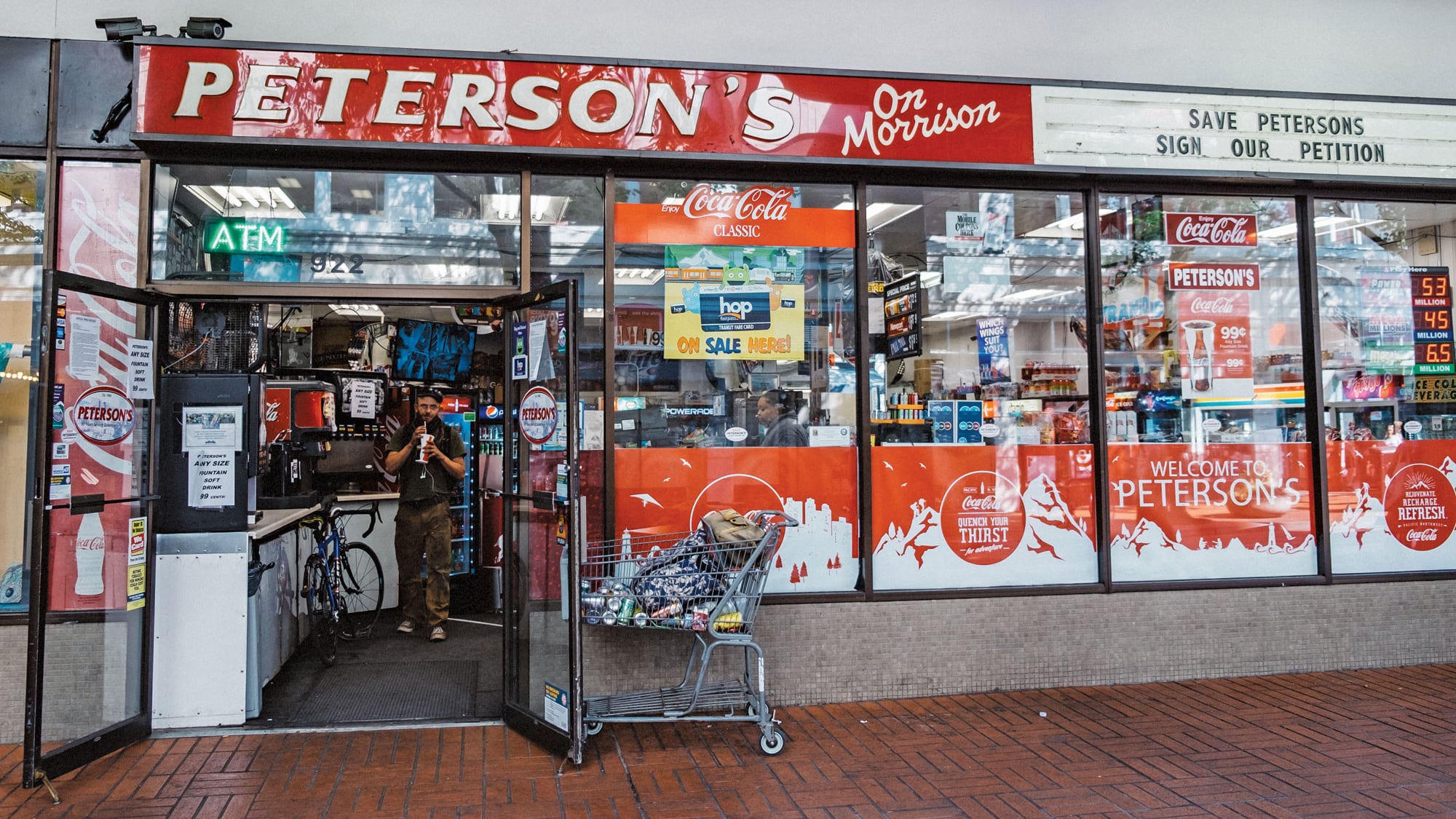The odor of urine wafts from the parking garage stairwell at Southwest 10th Avenue and Morrison Street on a summer night in Portland.
Vacationers in pressed clothing and rolling elegant luggage hop on and off the MAX train, dodging the young troubadours who loiter outside of Peterson's, a venerable convenience store at 922 SW Morrison St. Middle-aged men rattle by on skateboards, cigarettes dangling. Panhandlers claim they'll settle for human contact, displaying a "Hugs 4 Hugs" sign.
For more than 30 years, Peterson's has been a magnet for MAX riders, transients, and anybody who needs cigarettes, beer or the current hot seller: 99-cent fountain drinks, "any size."
"We're not fancy," says owner Doug Peterson. "We're selling the needs that people need. And we're very popular."
But Peterson's Morrison Street location (he owns three other stores elsewhere in the city) could soon be just a memory. The city's urban renewal agency, Prosper Portland, and the Portland Bureau of Transportation are preparing to renovate the city-owned Yamhill SmartPark garage, which houses Peterson's on the ground floor. Peterson's loyalists think the city wants the store gone. If that happens, they say a gritty slice of the city's identity will be lost.
Ray Tillotson, who for decades ran Ray's Ragtime, a consignment shop near Peterson's, got priced out of downtown last year.
He says the city's west end is losing its flavor. "It was a very vibrant little neighborhood," Tillotson says. "It's been a gradual exodus for the past 30 years."

Peterson's helped shape a generation of Portlanders, even as it faced opposition from city bureaus. In 2008, the upscale clothier Brooks Brothers moved into the Galleria mall across the street. The company's clientele and Peterson's were not the same.
"I fail to see why a disgusting store such as Peterson's is able to stay open," an assistant manager of Brooks Brothers emailed then-Mayor Sam Adams. "It caters to the dregs of society."
The store survived the pressure, but the threat is more serious now. Every business in the Yamhill garage will have to vacate starting January 2018 for a yearlong, $25 million renovation.

Prosper Portland plans to divide the building's ground-floor retail spaces, like the one Peterson's occupies, into smaller storefronts with lower rent for businesses owned by women and people of color.
One of the agency's goals for the renovation is to "improve the environment at the ground-level retail and stairways."
The master lease for the building says when it's renovated, tenants may not sell alcohol to go, an integral part of Peterson's business. The city will also give priority to retailers with three or fewer locations. Peterson owns four stores.
Peterson finds those restrictions suspiciously specific. "I read into that," he says, "that they're making those rules to keep us out."

Customers and some politicians want the store to stay open. "We urge Prosper Portland to see the value of supporting a small business with over 30 years of service downtown and to sign a long-term lease with Peterson's," City Commissioners Dan Saltzman and Chloe Eudaly wrote in a June 30 letter to then-Prosper Portland board chairman Tom Kelly.
"Save Peterson's" stickers are cropping up across the westside, and Peterson has gathered around 2,200 signatures on a petition. One signer called the store a "blessing to the destitute."
Prosper Portland says Peterson's is welcome to apply for a return. "We will have a competitive process for folks who are in the space today as well as others," said Lisa Abuaf, the agency's project manager for the garage renovation.
"Businesses that complement each other will be really important," Abuaf adds, noting her agency is seeking retailers that are "vibrant and can compete."
Tillotson fears the city will trade away part of its soul to encourage diversity.
"Women and minorities need help," he says, "but over the dead bodies of existing businesses?"

